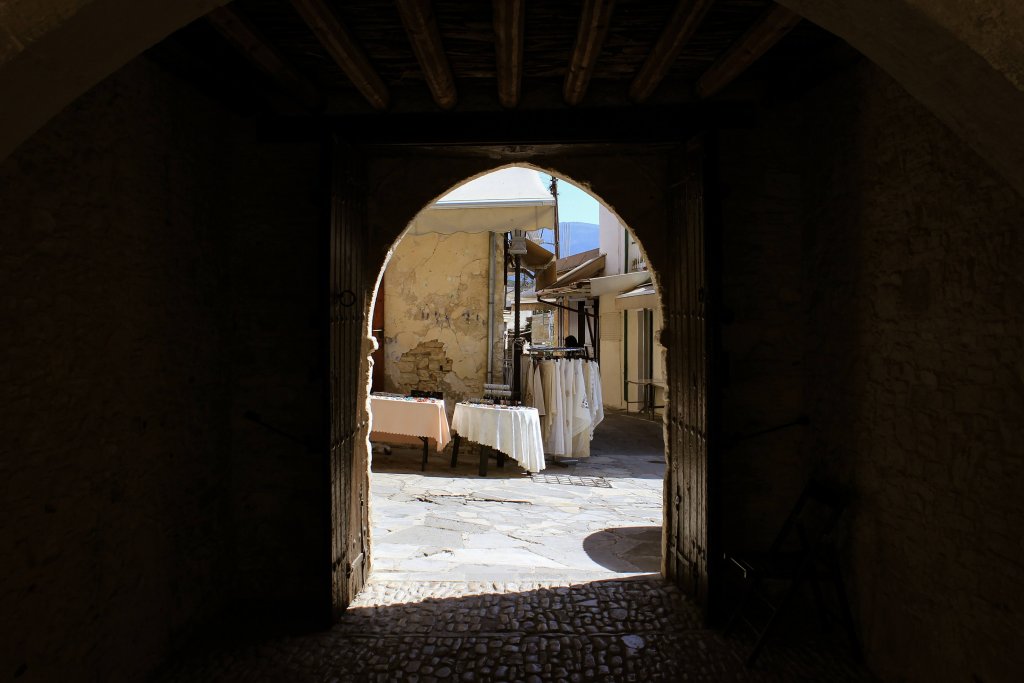
The two sides in Cyprus have so far managed the global COVID-19 pandemic in isolation to each other. On the one hand, the early enforcement of a lockdown and the relative inaccessibility of Cyprus as an island have proven beneficial for handling COVID-19. On the other hand, the lack of bicommunal cooperation during this time of crisis puts the future of the peace process at risk.
On 28 February 2020, the Greek Cypriot led Republic of Cyprus (RoC) unilaterally restricted crossings between the two sides of the island, including the main checkpoint to and from the North through the popular Ledra Street/Lokmacı checkpoint in the heart of divided Nicosia. Although Greek Cypriot leader President Nicos Anastasiades explained the restrictions were both temporary and precautionary, groups in favour of reunification staged protests on both sides of the checkpoint, seeing the policy as politically motivated rather health related. On 28 February 2020, a group of Greek Cypriot protestors barged through the barricade to the North, and scuffles broke out with Greek Cypriot police officers. This action was countered several days later when Greek nationalists staged a demonstration in favour of the restrictions and demanded permanent closure of all crossings. In turn, on 7 March, 2020, pro-reconciliation protestors gathered on either side of the Ledra Street crossing. This time, Turkish Cypriot protestors attempted to cross to the South, prompting Greek Cypriot police to use teargas spray.
On 9 March, Cyprus recorded its first two cases of COVID-19, both in the South. The next day, the first case was announced in the North. In the ensuing panic, leaders on both sides cut off contact with the outside world – and with each other. In lockstep with the rest of the world, Cyprus was rushing toward an indefinite lockdown. On 12 March, the (internationally unrecognized) Turkish Republic of Northern Cyprus (TRNC) announced the temporary closure of two additional crossings and banned travellers from 22 countries. Turkish Cypriot authorities extended the original restrictions on crossings, rendering checkpoints unusable. On 21 March, following efforts for repatriation of its citizens, the RoC instituted a ban on all inbound flights. Turkey then recorded its first cases of the coronavirus, and Turkish Airlines service to Ercan/Tymbou airport was suspended on 28 March.
The early lockdown and interruption of flights has meant few COVID-19 related deaths on the island (19 as of 24 May). Cypriots were hardest hit, not on the island but in the diaspora, particularly in the UK, where the community of approximately 110,000 experienced an estimated 317 casualties (as of 24 May), making UK Cypriots one of the most vulnerable groups worldwide. A combination of age (first-generation Cypriots are generally an elderly community), socioeconomic factors, patterns of socialization and public-facing professions contributed to the disproportionate number of casualties. Several diaspora-led initiatives, including bicommunal ones, such as the COVID-19 UK Cypriot Communities Solidarity group, have worked to address the needs of the victims. Surprisingly, neither the plight of Cypriots in the diaspora not the ensuing community work has received attention, either in the island or in the international media.
Glimpses of cooperation
In Cyprus, with the exception of a limited exchange of information and medical supplies, the two sides have prioritized individual responses to address the COVID-19 crisis. The lack of cooperation and coordination most certainly reflects the nature of the pandemic and the need for isolation. But it can also be attributed to declining trust between the leaders. In the months preceding COVID-19, tensions had been increasing, with disagreements on hydrocarbon extraction from the Eastern Mediterranean entering regional disputes. At the same time, Turkish Cypriot leaders announced their intention to unilaterally open Varosha, a ghost town under military occupation since 1974, adding to the rising tension.
Nonetheless, cooperation has resumed in a number of areas. For example, on 17 May, ROC sent airplanes to help Turkish Cypriots firefighters battle a massive fire in the northwest of the island. The two leaders also agreed to allow crossings for certain groups as of June 8, specifically Turkish Cypriots working or studying in the South, those receiving treatment at hospitals and enclaved Greek Cypriots or Maronites permanently residing in the North. The importance of this decision cannot be underestimated. The opening of the Green Line separating North and South had been a major step towards peace, and the COVID-19-related (partial) closure in May 2020 represented a devastating step backwards. Since 2003, crossings had been increasing; more than 40 million crossings had taken place, and economic activity between the two sides had increased. Scholarsin Cyprus linkintergroup contact to reduced prejudice, increased willingness for cohabitation and less willingness for partition.
Despite the recent relaxation of restrictions, questions about how and whether Green Line crossings will fully resume in the near to medium term are inevitable. As with the suspension of Schengen Zone freedom of movement in the European Union (EU), the pandemic has direct implications not just for the economic future of Cyprus but also for reunification talks.
Thinking Ahead: Cooperation in the COVID-19 Era
Pointing to the mismanagement of the crisis elsewhere around the globe, Greek and Turkish Cypriot authorities both claim to have coped effectively. Although the island’s tourism industry has suffered, polls show President Anastasiades’ public approval ratings have soared, whilst Turkish Cypriots are arguably among the first to have eradicated COVID-19. Despite current approval of the management of COVID-19, however, it is conceivable that political careers will be made and broken based on the post-lockdown management, particularly the success of the financial recovery efforts.
On the one hand, in the following weeks and months, joint action across the divide might become more conceivable. Bicommunal groups in Cyprus have pointed to examples of cooperation around the world, including in Israel and Palestine and cross-border assistance in France and Germany. Clearly, the ‘demand’ to open the border crossings may influence decision-makers and even introduce new confidence-building measures. On the other hand, ethno-nationalists may lobby to preserve a new status quo and minimized contact. The outcome will depend on public attitudes, but also on the ingenuity of political leaders.
Working through the bicommunal technical committee structures is probably the best way to ensure effective communications and coordination going forward. A bicommunal technical committee on health was established in 2008 as part of ongoing peace talks. Therefore, sharing medical supplies, expertise and even personnel could be possible and beneficial for both sides. A demonstrable success in health care coordination could conceivably result in greater appreciation of interdependencies and of the institutions regulating relations. The most urgent confidence-building measure would be to permit the use of checkpoints for the use of ambulances/medical practitioners. Extending this potentially life-saving measure to Piroi/Gaziler and Kokkina/Erenkoy would give villages close to the Green Line quicker access to emergency treatment – from several hours to less than 40 minutes for some.
Greek Cypriots could lobby the EU for additional emergency aid to Turkish Cypriots. TRNC’s relative isolation as a de factostate has been beneficial during the pandemic, but Turkish Cypriots are expected to suffer financially in upcoming years. A deep recession could undermine any efforts to achieve macro-economic convergence on the island. Turkish Cypriots postponed holding a presidential election for six months; due to the semi-presidential system and division of power between pro-federation Mustafa Akıncı and his challenger PM Ersin Tatar, it is still unclear to know who benefited from the management of the crisis. Tatar heads a coalition government that has been tested by the pandemic. Initially Tatar downplayed the threat and was hesitant to impose curfews and lockdowns with apparent concern for the economic consequences. By contrast, the Deputy PM, Kudret Ozersay, was far more keen. President Mustafa Akıncıpinned the blame on the government for failing to lockdown quickly. Akinci argued in favor of declaring a state of emergency. Later, the government criticized Akinci for his role in importing drugs from the RoC through the bi-communal technical committee on health. The crisis prompted the establishment of a COVID-19 Coordination Council, but instead of rendering pandemic policy technical it actually led to confusion regarding lines of authority between the committee and the Minister of Health regarding quarantines and virus testing. Ultimately, the lockdowns curtailed the spread of the virus. The economic recession induced has decreased the government’s revenue, requiring grants and loans from Turkey. Across the island, the deepening of the looming economic crisis could erode popular confidence in EU institutions and the reunification efforts. Much is at stake for the EU, not only in terms of shoring up Schengen, but also in terms of its broader commitments to member states, including divided Cyprus. The future of the Union requires a demonstration of solidarity. This includes winning the battle of narratives not only in Cyprus but also its neighbourhood. Alongside this, both sides in Cyprus (as well as Greece and Turkey) should commit to cancelling military exercises and impose a moratorium on drilling activities in the Eastern Mediterranean for the remainder of the year. This could give time for UN mediation efforts to assume a more inclusive orientation.
Ironically, COVID-19 may still work towards peace. The work of bicommunal activists outside Cyprus has demonstrated the need to integrate diaspora voices and concerns through a dedicated technical committee. The crisis has offered an opportunity for Cypriot citizen groups to re-organise themselves via Zoom and other online platforms and as a result to reconnect more widely with members of the diaspora but also within Cyprus itself. In fact, Cypriot peace pioneers were among the first to use online programs for contact purposes when the two communities were hermetically sealed from one another (e.g. through the US-led tech4peace program). But now such initiatives are more broadly available to the average citizen and could offer Cypriots in the island and abroad multiple new venues for engagement in civic life whilst facing the uncertainties of the post-COVID-19 era.
_______________________________________________________________________________________________

Prof. Dr. Erol Kaymak, is Professor of International Relations at Eastern Mediterranean University. He has published research reports for the United Nations in Cyprus (UNFICYP), CEPS, Interpeace, and other organizations. Dr. Kaymak is co-founder and former director of a Cyprus-based think tank, the Centre for Sustainable Peace and Democratic Development (SeeD). He currently serves as Coordinator for the Cyprus Chapter of the Greek Turkish Forum (GTF) that aims to contribute to bilateral relations between Greece and Turkey.

Prof. Dr. Neophytos Loizides, is Professor in International Conflict Analysis at the University of Kent and the Director of the Conflict Analysis Research Centre (CARC). He is the author of ‘The Politics of Majority Nationalism’ (Stanford 2015) and ‘Designing Peace’ (Penn 2016) and ‘Mediating Power-Sharing’ (Routledge 2018 with Cochrane and Bodson). He has also authored articles in the areas of forced displacement, nationalism and conflict regulation in deeply divided societies including most recently work published in Political Psychology, Ethnic and Racial Studies, and International Migration.
To cite this work: Erol Kaymak and Neophytos Loizides , “COVID-19 in Cyprus”, Panorama, Online Publication, 2 Jun 2020, https://www.uikpanorama.com/blog/2020/06/02/covid-19-in-cyprus/
Copyright@UIKPanorama. All on-line and print rights reserved. Opinions expressed in this work belongs to the author(s) alone, and do not imply endorsement by the IRCT, the Editorial Board or the editors of the Panorama.

